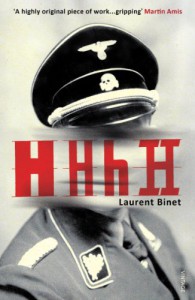86
Followers
34
Following
Seriously, Read a Book!
Thoughts on books, often interpreted through the high-brow prism of cartoon (read: Archer) references. Wait! I had something for this...
Currently reading
Land of LISP: Learn to Program in LISP, One Game at a Time!
The Sketchnote Handbook: The Illustrated Guide to Visual Notetaking
The Antidote
The Kind Worth Killing
James Buchanan
HHhH: A Novel
 About two-thirds of the way through the book, the author ([a:Laurent Binet|3465954|Laurent Binet|https://d202m5krfqbpi5.cloudfront.net/authors/1342709342p2/3465954.jpg]) reflects:
About two-thirds of the way through the book, the author ([a:Laurent Binet|3465954|Laurent Binet|https://d202m5krfqbpi5.cloudfront.net/authors/1342709342p2/3465954.jpg]) reflects:“To begin with, this seemed a simple-enough story to tell. Two men have to kill a third man. They succeed, or not, and that’s the end, or nearly” (p.208).
This is a telling passage first, because it is an example of Binet’s constant presence in the “novel” (which, in some ways, is just as much a diary of his experience of writing this book as it is the story itself, at times) and, second, because it is true. This is not a book with numerable characters. What happens is a culmination of geopolitics, quotidian coincidences, and methodical planning (to name only a few).
I learned an enormous amount of history in reading this- well, I’m not sure what to call it- at one point Binet refers to his work as an ‘infranovel’. The stories are heartbreaking and fascinating, triumphant and devastating. At times, Binet’s commentary on the choices of others who have sought to “novel-ize” the story of Heydrich’s assassination seemed to be too much; while, at the same time, I appreciate his candor about the process of relaying the incredible and true stories of history.










